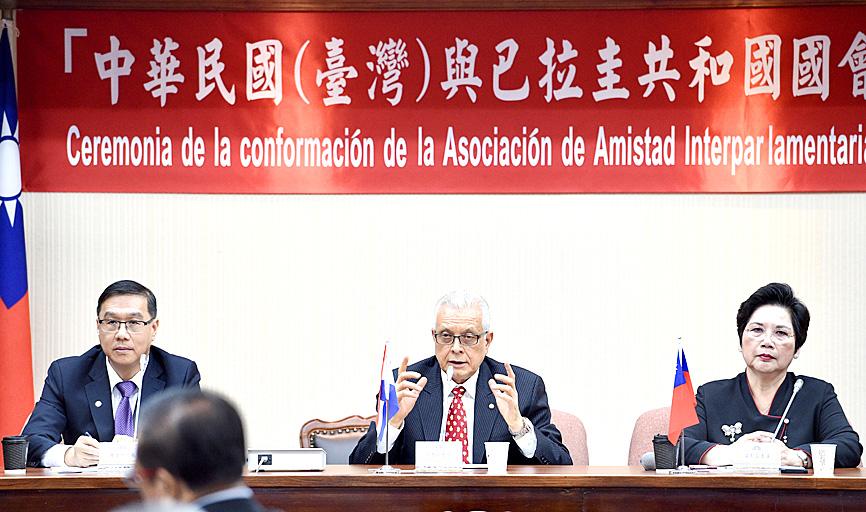Paraguayan Ambassador to Taiwan Marcial Bobadilla Guillen yesterday said that his country resolutely opposes the establishment of ties with Beijing, despite increasing pressure from China.
Companies in Paraguay have been calling for the government to cut ties with Taipei in favor of Beijing, but “Taiwan, not China, is Paraguay’s friend,” Guillen cited Paraguayan President Mario Abdo Benitez as saying.
Benitez hopes Taiwan and Paraguay will continue to deepen that friendship, Guillen said during an inauguration ceremony for the 23-member Republic of China (Taiwan) — Republic of Paraguay Inter-parliamentarian Friendship Association.

Photo: Peter Lo, Taipei Times
Chinese Nationalist Party (KMT) Legislator Wen Yu-hsia (溫玉霞), who launched the association, said she hopes it will be a “bridge between the two countries through which its members can make contributions” to the friendship between the two nations.
Deputy Minister of Foreign Affairs Miguel Tsao (曹立傑), Overseas Community Affairs Council Vice Chairwoman Hsu Chia-ching (徐佳青), Legislative Yuan Secretary-General Lin Chih-chia (林志嘉) and KMT Legislator Sandy Yeh (葉毓蘭) also attended the ceremony at the legislature in Taipei.
Despite the two nations’ geographical distance, Paraguay has been an important ally, demonstrated by Taiwan’s donation of 1 million masks and other medical supplies to help Paraguayan medical workers deal with the COVID-19 pandemic, Wen said.
Although Beijing has been trying to coerce Asuncion into switching recognition by pressuring Paraguayan companies, Paraguayans have the right to choose their friends, Guillen said.
Paraguay is Taiwan’s most important ally in South America, and a strong trading partner, Tsao said.
By the end of this year, Taiwan would have imported an estimated 20,000 tonnes of Paraguayan beef worth US$100 million, 10 times the amount it imported five years ago, he said.

The manufacture of the remaining 28 M1A2T Abrams tanks Taiwan purchased from the US has recently been completed, and they are expected to be delivered within the next one to two months, a source said yesterday. The Ministry of National Defense is arranging cargo ships to transport the tanks to Taiwan as soon as possible, said the source, who is familiar with the matter. The estimated arrival time ranges from late this month to early next month, the source said. The 28 Abrams tanks make up the third and final batch of a total of 108 tanks, valued at about NT$40.5 billion

Two Taiwanese prosecutors were questioned by Chinese security personnel at their hotel during a trip to China’s Henan Province this month, the Mainland Affairs Council (MAC) said yesterday. The officers had personal information on the prosecutors, including “when they were assigned to their posts, their work locations and job titles,” MAC Deputy Minister and spokesman Liang Wen-chieh (梁文傑) said. On top of asking about their agencies and positions, the officers also questioned the prosecutors about the Cross-Strait Joint Crime-Fighting and Judicial Mutual Assistance Agreement, a pact that serves as the framework for Taiwan-China cooperation on combating crime and providing judicial assistance, Liang

A group from the Taiwanese Designers in Australia association yesterday represented Taiwan at the Midsumma Pride March in Melbourne. The march, held in the St. Kilda suburb, is the city’s largest LGBTQIA+ parade and the flagship event of the annual Midsumma Festival. It attracted more than 45,000 spectators who supported the 400 groups and 10,000 marchers that participated this year, the association said. Taiwanese Designers said they organized a team to march for Taiwan this year, joining politicians, government agencies, professionals and community organizations in showing support for LGBTQIA+ people and diverse communities. As the first country in Asia to legalize same-sex

MOTIVES QUESTIONED The PLA considers Xi’s policies toward Taiwan to be driven by personal considerations rather than military assessment, the Epoch Times reports Chinese President Xi Jinping’s (習近平) latest purge of the Chinese People’s Liberation Army (PLA) leadership might have been prompted by the military’s opposition to plans of invading Taiwan, the Epoch Times said. The Chinese military opposes waging war against Taiwan by a large consensus, putting it at odds with Xi’s vision, the Falun Gong-affiliated daily said in a report on Thursday, citing anonymous sources with insight into the PLA’s inner workings. The opposition is not the opinion of a few generals, but a widely shared view among the PLA cadre, the Epoch Times cited them as saying. “Chinese forces know full well that